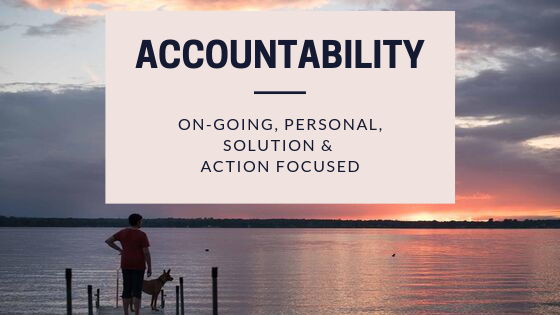To look at ways to improve our accountability we have to make sure we understand the term.
Accountability has become a buzz word, and we, in that way humans do, like to hide behind buzzwords. "If I had an accountability buddy," we might moan, "why, then I would train every day!"
"If only I had some reason to be accountable I would do better at shows."
What is accountability?
While there are many elements to accountability, the ones that matter to most of us in dog training include trustworthiness, and accepting our obligations – both for successes and challenges.
Trustworthiness matters because we need to always remember we are half of a partnership, and it's half of the relationship that chooses to add training and competitive stresses to what we do together. Because of that, we end up needing to admit our responsibility for the planning, implementation, wins and stresses.
Accepting our obligations means that another portion of accountability is taking action. It helps to understand that accountability is taking responsibility when we aren't doing the work required to accomplish the results we want.
Why does accountability matter?
When we are accountable, we value our work – this means that we take pride in what we do and strive to do and be, and that we strive to be our best. If we aren't accountable, we don't care. Things can slide by us in a haze of "get it done" or "it doesn't really matter."
Neither of which moves us forward and closer to achieving our goals.
It lets us focus on things we want to achieve and cuts back on the time spent agonizing over the things we aren't doing. Accountability allows us to set priorities and honor commitments – not only to others but to ourselves. It allows us to meet goals (either process or outcome) that we set.
Goals make a big difference as they provide us with an end target that we can hold ourselves to account over. They give us goalposts as it were – a direction to aim, and an impetus to plan, and then execute said plan.
I asked the FDSA instructors about goals and, while they are all at different stages of how they use goals, each of the ones who replied felt goals help them make the most of their training. Helene uses goals to inform her systems and help her find focus. Deb's goal is class videos and fun. Very different goals, but both important!
Shade, Julie S, and Nancy have trial goals that then give them the information they use to inform the next block of training they do. Julie F and I had a lovely little aside about if goals are internal or external, and Chrissi reminded me of the importance of flexibility in goal setting.
Everyone has their own take on goals and needs to have different goals in their repertoire. That's ok. But it is an aspect of accountability that is worth spending some time mulling over. While goals serve different purposes (something we explore in-depth in my FDSA class No More Excuses) their contribution to developing a sense of accountability can't be ignored.
What does accountability look like?
It's not a one-time thing – it's ongoing. Being accountable matters over a range of time, not in a moment.
It is, unlike so many of the things I discuss, personal. You don't delegate accountability. You own it. You alone either are, or are not, accountable to yourself.
It is solution-focused. It is implementing, thinking, planning and doing.
It is action-based. When you are being accountable you are doing something proactive and positive.
12 Ways to Improve your accountability
It is possible. It is not easy. A methodical approach to building your accountability skills will help you use it not only when you need to be accountable but when you want to accomplish things for yourself.
- Prioritize. You and you alone get to decide what matters most to you. Selecting a sport to focus on, a trainer to work with, a class to take, a venue to show at will all help you focus and train more specifically. Slicing and parsing work as well for the human half of the team as the canine side. Lumping makes being accountable more difficult.
- Seek feedback. Be brave. Put yourself out there and ask people for help. What areas of your training need work? Who can help you identify your strengths and weaknesses – both in skill and in your plan?
- Prepare your self mentally. Stepping up your personal accountability isn't easy. Think through the steps you want to take and get your mind wrapped around the actions required to follow through on the idea of being "accountable". Your mind is your secret weapon or your not so secret enemy as you have probably already discovered! Taking the time to make sure you are mentally ready to expend energy into accountability is a good thing! Find a buddy, find a FB group, think about what systems will help you on this quest!
- Organize what you need. Being prepared is a very good motto to borrow for this intention to become more accountable. How are you going to measure accountability? In a journal? Do you have one ready? Do you have pens you like to write with? Have you found an app or calendar you want to test? Have you downloaded it? Is your training area clear of clutter and ready to go? And so on. Get things in order before you choose the day you will be accountable for your training.
- Keep Records. It's difficult to monitor what you do accomplish without keeping track. If you record keep you may be able to notice trends – for example, if you never train on Wednesdays, they might become a good break day instead of a day you are frustrated with yourself for not training.
- Set goals. You've likely heard me on this, maybe in this podcast episode, before. I've touched on it in the intro above too but it bears repeating. Goals can be a great driver of motivation and being motivated increases our desire to hold ourselves to account. It's a pretty clear cycle and we can use each of Motivation, Accountability and Goal Setting to drive the other pillars forward.
- Note accomplishments. Pause and recognize what you are completing. Because you are getting things done. Even if it's not what you want, getting up, getting dressed, feeding yourself – those are primary blocks of success and when times are challenging, they are actions that are so much bigger than feel. Staying functional is itself an accomplishment and then as we start to add to the list, work, family, house, creating time and finding the energy to do the things we want to do gets harder and harder. Remembering to note what you are doing will help you keep going and also help ensure that you cut yourself a little slack if ALL THE THINGS just take a back seat to survival for a day or two. Reward yourself when you are proud of something you have done – or celebrate with your friends. Success begets success after all!
- Play to your Strengths. That is to say, build a component of accountability in for things you are good at. Don't negate the work you are doing … if a stay is something you are good at training continue working on it, and recognize the effort you are making. If training in the evening is easier than in the morning keep training at least occasionally in the evening and slowly increase the challenge of making morning training time. Working from strengths is a very good way to keep your accountability high.
- Build skills to improve weaknesses. If you know you have a gap, perhaps you have been avoiding something because of this hole spend some time discovering how you can fill the gap. Is there a local class or FDSA class that can help you? Is there someone you could spend time with that could help you overcome this hurdle? There is lots of information to sort through and while ricocheting from one answer to another will likely increase your stress being honest with the gaps you have – no matter if they are specific training knowledge holes or gaps in understanding planning and implementation processes.
- Assign times to things. Having a scheduled life may seem boring but taking the time to plot out blocks of time is a boon to accountability. My days are quite full and very booked. I am not always on schedule perfectly but having things mapped out means I don't miss deadlines, nor do I have long gaps where there is no training. Put the things you can do on rote in the times you struggle with motivation and schedule your best time for your most important priorities. Some people are night owls, some early birds. Use "play to your strengths" to advantage with this item.
- Create new habits. Habits are hard to build and hard to sustain. One easy tip to build a new habit is to attach it to an old habit. That's the reason training in commercials worked when we watched traditional TV. There are several good books on the subject and it's a major focus of my annual FDSA course No More Excuses (running October 1- November 12 this year) so if you feel stuck by all means join me, I'd love to work through this with you!
- Take time for the things you enjoy and want to do. Accountability is not only for things we don't want to do or things we are struggling with. This dog training journey is supposed to be fun. If it isn't always fun that's ok but if all of it is feeling like is a burden and a chore take some time away. Hit the hiking trails, go watch the squirrels (or wallabies). You'll either figure out how you really want to use your time or you'll return refreshed and inspired. Use what you have learned about accountability to improve your training and make it work for you!
Have fun making accountability work for you! I can't wait to hear how it goes!

